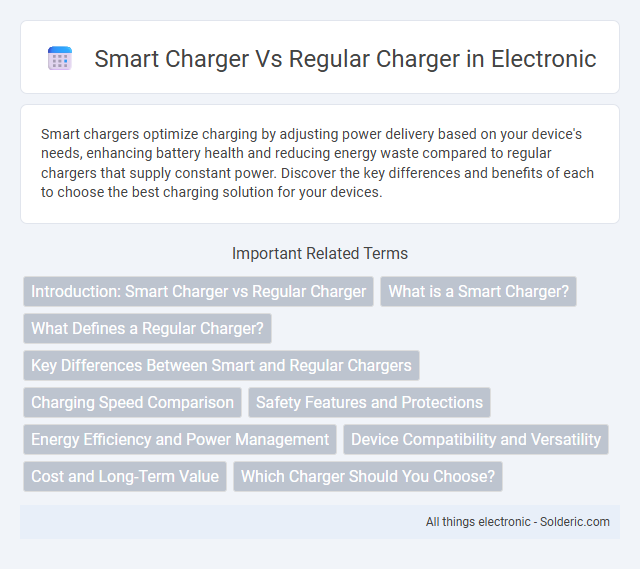Smart chargers optimize charging by adjusting power delivery based on your device's needs, enhancing battery health and reducing energy waste compared to regular chargers that supply constant power. Discover the key differences and benefits of each to choose the best charging solution for your devices.
Comparison Table
| Feature | Smart Charger | Regular Charger |
|---|---|---|
| Charging Speed | Faster with adaptive output | Standard, fixed output |
| Battery Health | Protects battery with automatic cutoff | No battery protection mechanisms |
| Compatibility | Supports multiple devices and batteries | Limited to specific device types |
| Safety Features | Overcharge, overheat, short circuit protection | Minimal safety features |
| Intelligence | Microprocessor-controlled charging algorithms | No intelligent control |
| Price | Higher cost due to advanced technology | Lower cost, basic functionality |
Introduction: Smart Charger vs Regular Charger
Smart chargers utilize advanced circuitry and microcontrollers to regulate voltage and current, optimizing battery health and charging efficiency compared to regular chargers. They feature adaptive charging protocols that adjust power delivery based on battery type, temperature, and charge level, reducing the risk of overcharging and extending battery lifespan. In contrast, regular chargers provide a constant current without intelligent monitoring, which can lead to slower charging times and potential battery damage over prolonged use.
What is a Smart Charger?
A smart charger is an advanced device designed to optimize battery charging by monitoring voltage, current, and temperature, preventing overcharging and extending battery lifespan. Unlike regular chargers, smart chargers use microprocessor-controlled algorithms to adjust the charging rate dynamically based on the battery's condition and type. This technology improves energy efficiency, ensures safety, and enhances performance for various rechargeable devices, including smartphones, laptops, and electric vehicles.
What Defines a Regular Charger?
A regular charger is defined primarily by its fixed power output and lack of intelligent features, providing a constant voltage or current regardless of the device's specific needs. It typically does not monitor battery status or adjust charging rates, leading to slower charge times and potential overheating risks. Your device may experience reduced battery lifespan or inefficiency when charged with a regular charger compared to smart alternatives.
Key Differences Between Smart and Regular Chargers
Smart chargers use advanced microprocessor technology to regulate voltage and current, preventing overcharging and optimizing battery health, while regular chargers provide a constant, unregulated power output. Smart chargers often feature automatic shutoff, multiple charging modes, and compatibility with various battery types, enhancing efficiency and safety. Regular chargers lack these intelligent functions, potentially leading to battery damage, reduced lifespan, and energy waste.
Charging Speed Comparison
Smart chargers use advanced technology like adaptive charging algorithms and voltage regulation to optimize charging speed based on device requirements, often delivering power more efficiently and faster than regular chargers. Regular chargers provide a constant power output, which can result in slower charging times, especially for devices that support fast charging standards. Your device can benefit from a smart charger by reducing overall charging time while protecting battery health through precise power management.
Safety Features and Protections
Smart chargers offer advanced safety features such as overcharge protection, temperature control, and short-circuit prevention, reducing the risk of damage to your device and battery. Regular chargers often lack these protections, making them more prone to overheating and potential battery degradation. Choosing a smart charger ensures enhanced safety and prolonged battery lifespan compared to conventional charging options.
Energy Efficiency and Power Management
Smart chargers optimize energy efficiency by automatically adjusting power output based on your device's battery status, reducing energy waste compared to regular chargers that deliver a constant current. Advanced power management in smart chargers prevents overcharging and overheating, extending battery lifespan and improving safety. Your devices benefit from faster, more efficient charging cycles, minimizing electricity consumption and making smart chargers a more sustainable choice.
Device Compatibility and Versatility
Smart chargers offer superior device compatibility and versatility by automatically adjusting voltage and current to match a wide range of electronic devices, including smartphones, tablets, and laptops. Unlike regular chargers, which provide fixed output tailored for specific devices, smart chargers support fast-charging protocols such as Quick Charge and USB Power Delivery, ensuring efficient and safe power delivery. This adaptability makes smart chargers an ideal solution for households and workplaces with multiple device types.
Cost and Long-Term Value
Smart chargers typically have a higher upfront cost than regular chargers due to advanced features like adaptive charging and battery health monitoring. However, they provide long-term value by extending battery lifespan and improving charging efficiency, which reduces the need for battery replacements and energy consumption. Regular chargers, while cheaper initially, can degrade battery health over time, leading to higher overall costs and shorter device usability.
Which Charger Should You Choose?
Smart chargers offer advanced features such as automatic shutoff, optimized charging speeds, and protection against overcharging or overheating, ensuring longer battery life and safety. Regular chargers provide basic power delivery without these intelligent mechanisms, which may risk battery damage or inefficiency. Your choice depends on whether you prioritize battery health and convenience or just need a simple, cost-effective solution.
smart charger vs regular charger Infographic

 solderic.com
solderic.com